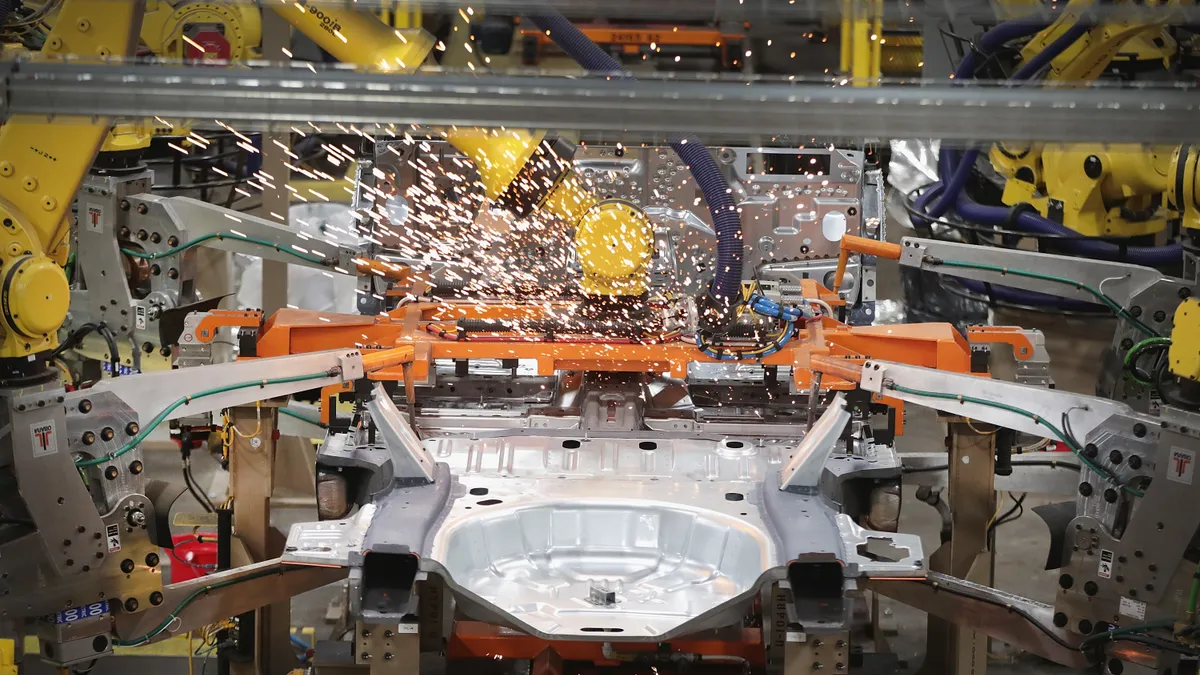Dive Brief:
- Ford is limiting or stopping production at multiple manufacturing facilities through July as a result of the global shortage of semiconductors, a spokesperson for the automaker confirmed.
- The Chicago Assembly Plant is the first facility to be affected with four weeks of downtime that begin this week. In total, production at eight plants is affected.
- Ford expects to lose 1.1 million units of production in 2021 as a result of the semiconductor shortages, according to its latest earnings release. "We now expect to lose about 50% of our planned Q2 production, an increase from the 17% loss in Q1," Ford CEO Jim Farley said on the automaker's most recent earnings call in April.
Dive Insight:
Automakers have been dealing with the shortage of semiconductors for the entirety of 2021 and parts of 2020. The components are vital for multiple parts in modern-day vehicles, but demand from other sectors, such as electronics, and supply-side issues have led to sweeping shortages.
The supply shortages are partially related to issues at multiple global factories that produce semiconductors. In March, a fire at a Renesas Electronics factory limited its output for months. And other chip makers' operations were hamstrung by a winter storm that hit Texas in February.
There are signs the market is improving on the supply side, though.
"The fabs that were impacted by the storm in Texas and the fire in Japan are back to their pre-crisis output levels," IHS Markit wrote in a research note last week.
Ford locations impacted by semiconductor shortage
| Facility | Impact | Date |
|---|---|---|
| Chicago Assembly Plant | Production is down | Weeks of July 5, 12, 19 and 26. Will run two shifts the week of Aug. 2 |
| Dearborn Truck Plant | Will run two crews | Weeks of July 12, 19 and 26 |
| Flat Rock Assembly Plant | Production is down | Weeks of July 12 and 19 |
| Hermosillo Assembly Plant | Will run one of two shifts | Weeks of July 12 and 19 |
| Kansas City Assembly Plant: F-150 line | Production is down | Weeks of July 12 and 19 |
| Kansas City Assembly Plant: Transit line | Production is down | Week of July 19 |
| Kentucky Truck Plant | Production is down | Week of July 12. Will run two shifts the weeks of July 19, 26 and Aug. 2 |
| Louisville Assembly Plant | Reduced schedule | Week of July 19 |
| Oakville Assembly Complex | Produce Nautilus only | Weeks of July 19, 26 and Aug. 2 |
The Michigan Assembly Plant will also be down the weeks of July 5 and 26, but for reasons unrelated to the semiconductor shortages. SOURCE: Ford.
But this doesn't mean supply will be able to meet demand any time soon. IHS Markit expects suppliers will be able to keep up with demand by the fourth quarter, but it might be 2022 before they're able to start working away at the backlog that's built up over time.
Executives at Infineon, a semiconductor supplier, laid out a similar timeline on a recent earnings call.
"We expect the imbalance between supply and demand to persist for a couple of quarters with a risk to extend into 2022, given the strength and diversity of demand drivers, extended lead times and generally lean inventory levels," Infineon CEO Reinhard Ploss said in May.
When Farley spoke at an analyst conference last month, he said dealing with the shortages has required close communication with Ford's suppliers.
"We've talked to our whole tier system," Farley said. "We have learned a lot that we at Ford and our industry are going to have to handle our supply chain differently for these key electronic components or digital components given that they're probably going to be more than 50% or 60% of our [Bill of Material]."
One strategy Ford is using in the near term is to prioritize completion of vehicles that were assembled without certain parts because of the semiconductor shortage, while also manufacturing new vehicles.
"This is in line with our commitment to get our customers their vehicles as soon as possible and consistent with our forecasted supply," the spokesperson said Friday.
General Motors CFO Paul Jacobson pointed out last month that this was not the first semiconductor shortage automakers have faced, and it's time to start thinking about long-term solutions to ensure supply.
"Whether we work with foundries to give longer-term commitments or we look to figuring partnering with folks, we're looking at all aspects of the supply chain to really ensure that something of this magnitude as it relates to chips doesn't happen again," Jacobson said.














